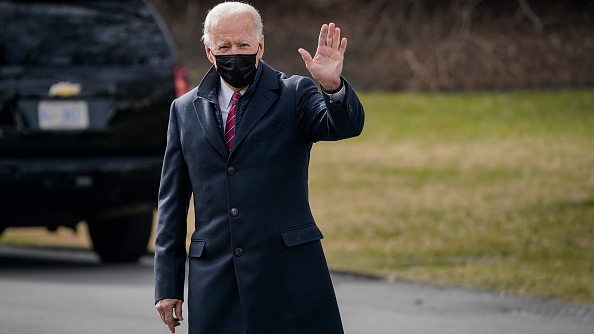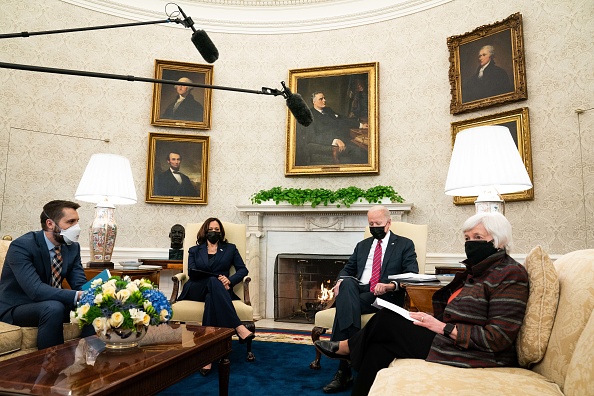
U.S. President Joe Biden walks to Marine One on the South Lawn of the White House in Washington, D.C., January 29, 2021. (Photo: Getty)
The new administration of U.S. President Joe Biden is still trying to find its footing as it works to confirm key members, pulls together a cohesive team and tests the water to find out exactly what world it's entered after the tumultuous years of Trumpism. After its first full week in action, it still has not taken clear stances on much-anticipated international issues – but certainly clear patterns are emerging, namely the administration's attempt to put America back on the world stage and revitalize the same Obama-era coalition that existed four years ago.
With so much at stake in the world with unprecedented issues like a global pandemic, worldwide political instability, renegade tech companies, climate change and other key foreign policy issues, certainly an internationally active Washington is a welcomed development. After all, as the world's premier power any unified global action will naturally have to involve the U.S. to be as effective as possible.
This is why the U.S. recommitting to the World Health Organization (WHO) and entering into its COVAX program is a necessary step to combat the COVID-19 pandemic, an issue of paramount global importance. Biden also made sure to call the leaders of his North American neighbors, Mexico and Canada, to shepherd relations into a more pragmatic direction.
Biden will also continue the U.S. trajectory of taking a less aggressive role in the Middle East. Now with the U.S. achieving energy independence and becoming a net exporter of crude oil, Biden's team has signaled a limited role in the region – though they will continue Trump's policy of gaining recognition for Israel among Arab countries, as was made clear in National Security Advisor Jake Sullivan's call with his Israeli counterpart.

(L-R) Director of the National Economic Council Brian Deese, Vice President Kamala Harris and President Joe Biden meet with Treasury Secretary Janet Yellen in the Oval Office of the White House in Washington, D.C., January 29, 2021. (Photo: Getty)
At the same time, Biden is not just posturing himself around diplomacy and focusing on issues involving a multilateral framework that can produce win-win results. It seems that he is, even timidly, testing to see if the same Obama-era coalition exists in order to try and contain perceived adversaries, like Russia and China.
In Asia, Biden spoke to Japanese Prime Minister Yoshihide Suga about the need for a "free and open Indo-Pacific" and "regional security issues, including China and [the Democratic People's Republic of Korea]"; National Security Advisor Sullivan spoke with his Indian counterpart about the Indo-Pacific region and "promoting regional security"; and Sullivan also spoke with his counterpart in South Korea about their countries' alliance.
On another hot button issue in the region, Sullivan indicated in a call with his Afghan counterpart that the Biden administration would take a tougher line with the Taliban, which could delay U.S. troop withdrawals and hamper a peace deal. As I explained in November, this is clearly being done to maintain a heavy military presence in China's neighborhood.
In fact, all of these conversations make it quite clear that Biden wants to revive or even expand Obama's coalition in Asia to combat a rising China, but this will prove daunting. The so-called Quadrilateral Security Dialogue (often called the "Asian NATO"), which comprises the United States, Japan, Australia and India each has distinct geopolitical aims and ambitions, meaning they are disjointed – and also in no position to part ways with China economically.
Each of these countries (minus India) has just joined the hugely important Regional Comprehensive Economic Partnership (RCEP), the largest free trade zone in the world, alongside China – and for good reason as countries struggle to recover economically from the COVID-19 pandemic. Petty provocations would only prove mutually destructive for the region as Australia is now learning over its spat with China, a country it relies on to export goods.
In Biden's calls in Europe, he talked to leaders of the UK, France, Germany and the NATO before showing bravado in a call with Russian President Vladimir Putin. Biden made clear in these calls that he would like to salvage transatlantic relations and mount a defense against "global issues," as he put it, like Russia and China. The problem, as I noted recently, is that Europe is not interested in a new Cold War as it simply fits no one's interest (at least not anyone in Europe).
Biden's team is evidently trying to jump back onto the international scene with the politics of yesteryear, believing that they will be welcomed with open arms and that America's exceptional character can forge a new alliance against "challenges" like Russia and China.
They are quickly learning, however, that this is only a repackaged version of the same "America First" politics of Trump – because no one in Europe or Asia has anything to gain from Cold War-like containment strategies against their neighbors.


